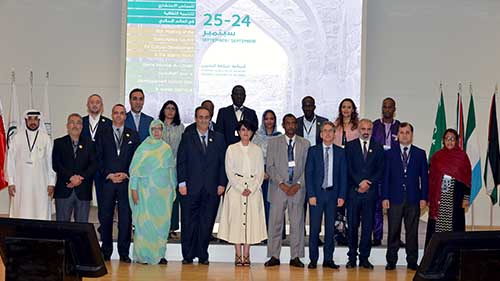25 September 2018
Closing Ceremony of the 16th Meeting of the Consultative Council for Cultural Development in the Islamic World,Its recommendations : preservation of the cultural and cultural heritage of Al Quds Al Sharif, Adopt Manama Process Activation of Joint Islamic Cultural Action to face extremism, sectarianism and terrorism


On Tuesday, 25 September, 2018, the working sessions of the 16th Meeting of the Consultative Council for Cultural Development in the Islamic World, held in Bahrain as part of the celebrations of Muharraq as the Capital of Islamic Culture 2018, have ended. The event is preliminary preparatory working sessions for the Extraordinary Islamic Conference of Culture Ministers in Manama, on 28-29 November 201, which is held under the High Patronage of under the High Patronage His Majesty King Hamad bin Isa Al Khalifa, May God Protect Him.
Her Excellency Shaikha Hala bint Mohammed Al Khalifa, Director-General of Culture and Arts, the Bahrain Authority for Culture & Antiquities, expressed while addressing the delegates and guests on Behalf of H.E Shaikha Mai bint Mohammed Al Khalifa, President of the Bahrain Authority for Culture & Antiquities, the satisfaction and appreciation of BACA to hold such a meeting. H.E added that the 16th Meeting of the Consultative Council for Cultural Development in the Islamic World is a message to the Arab and Islamic worlds that we remain proud about our unique and exceptional civilisation, and we work to promote this bright image throughout the whole world. H.E added that the President of Bahrain Authority for Culture & Antiquities has called on the Arab and Islamic countries to support Muharraq as the Capital of Islamic Culture 2018 and to back up her call on UN Educational, Scientific and Cultural Organization (UNESSCO) to adopt a resolution to proclaim November 18 of each year as International Day of Islamic Art.
The two-days meeting working sessions discussed two main subjects, namely the best ways and means to gather support from the Arab and Islamic worlds to preserve the heritage of Al Quds Al Sharif and secondly being on how together we can counter terrorism and extremism. Its recommendations highly concentrated on the firstly; establishing contact with organizations and institutions concerned with the issue of Al-Quds Al-Sharif in order to take stock of relevant programmes as well as consult with them regarding coordination and cooperation, to make proposals on means to procure necessary funding resources for the execution of the programmes devoted to Al-Quds, unified actions against the excavations by the Israeli occupation forces in the environs of Al Aqsa Mosque, in total lack of deference to the archaeological and religious monuments in Al Quds Al Sharif which Muslims and Christians treat as sacred, Israel's systematic continuous approach in” judaizing” the Palestinian sector of East Jerusalem , to coordinate and follow up the implementation of the programmes dedicated to the protection of cultural assets in Al-Quds, experts and expertise to protect Al-Qods Al-Sharif’s tangible and intangib le heritage. The meeting also recommended more activities and programs to be planned to promote and present Al-Qods cultural heritage to youth and children through field visits too.
The second issue addressed was to ‘Protect Manama Process on the Activation of Joint Islamic Cultural Action’ to face extremism, sectarianism and terrorism., which recommended ; drawing guidance from “ Manama Process” and finding ways to plan strategies and cultural national programs, enhancing partnerships between the Ministry of Culture, and others concerned with education, youth, sports, religion, social affairs, human rights and society police, media and communication in order to combat extremist ideologies and protect young people from their scourge are among the main objectives of this national initiative in Bahrain. to continue and develop its long history as a multi-faith and multi-cultural community, channel religious discourse given the role of the religious sermon in pointing out the difference between terrorism, jihad and the rights of peoples to defend their homeland and things they hold sacred, and in repudiating terrorism in all its forms and manifestations, need to spread wider the values of moderation, contain extremists and engage in dialogues with them and between all components of the civil society. Indeed, inter-cultural and interfaith dialogue has been a priority for the OIC in developing a culture of peace and moderation among nations and civilizations. Promoting interfaith harmony remains at the heart of cultural diplomacy of the OIC.
The meeting was attended by representatives of the Hashemite Kingdom of Jordan, Kingdom of Bahrain, Union of Comoros, Republic of Tajikistan, Republic of Turkey, Republic of Kazakhstan, Republic of Togo, Republic of Sierra Leone, and the Republic of Niger, Sudan, Kingdom of Saudi Arabia, Morocco, Palestine, as well as representatives of Islamic council Member states, representatives of the Organisation of Islamic Cooperation and the OIC’s Standing Committee for Information and Cultural Affairs (COMIAC).







